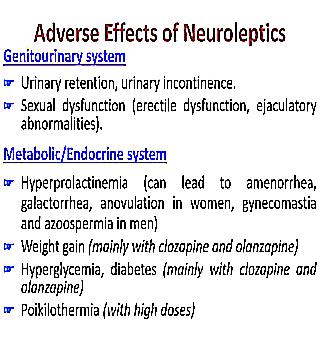Home >
Erectile Dysfunction >
Impotence from neuroleptics
Impotence from neuroleptics

Antipsychotics include medications that have antipsychotic effects. These substances are actively used to help patients suffering from certain mental disorders. Undesirable consequences in the form of a decrease in libido are manifested in men who allow the uncontrolled use of antipsychotics (heralen and neuleptil, butyrophenone and thioxanthene, sulpiride and diphenyl). In some cases, neuroleptic hyperprolactinemia syndrome can be caused by an increased sensitivity of the body to drugs or a combination of incompatible drugs.
Pharmacological action of neuroleptics
Antipsychotic substances have a hypnotic effect. When using small doses of antipsychotics, patients fall into a drowsy state, get rid of the problems associated with prolonged falling asleep and early awakening. Antipsychotics increase the effectiveness of analgesics and local anesthetics, but weaken the effect after taking psychostimulants. Medicines are divided into groups depending on the effects produced (antidepressant, energizing, sedative). As a result of taking most antipsychotics, the following mechanisms occur:
- inhibition of the reticular formation of the brain
- weakening of control over the activity of the cerebral hemispheres
- decrease in the excitability of the central and peripheral nervous system
- change in neurochemical (mediator) processes in the brain
- slowing down the secretion of corticotropin and growth hormone by the hypothalamus
Syndrome of neuroleptic hyperprolactinemia
Hyperprolactinemia is a functional disorder resulting from prolonged use of antipsychotic medications. Endocrine disease is associated with an increased level of prolactin in the blood. The disorder is transient in nature and stops after the main components of the drug are removed from the body and the normal level of prolactin is restored.
Signs of neuroleptic hyperprolactinemia
During the period of use of antipsychotics in men, the following undesirable symptoms may occur:
- decreased sexual desire
- gynecomastia (breast enlargement)
- impaired erection and ejaculation
- increased body weight and appetite
- galactorrhea (spontaneous flow of milk from the mammary glands)
Endocrine disorder entails the development of psychotic pathologies, increased irritability, excessive anxiety and sleep disturbance. Patients complain of increased fatigue and memory loss, pain in the heart and depression. Prolonged hyperprolactinemia leads to a decrease in bone mineral density, an increased risk of fractures and dislocations. Most often, patients suffer from injuries of the femoral neck and bones of the forearm. Autoimmune disorders such as antiphospholipid syndrome occur. In 30% of patients, psychoemotional disorders develop, in particular, instability of the psychological state, autism and psychosocial maladjustment. Patients may suffer from vegetative disorders and migraines, dizziness and decreased visual acuity.
Complications of neuroleptic hyperprolactinemia
If the patient does not stop taking medications and the level of prolactin in the blood plasma rises for the limit values, then the risk of developing such serious consequences as:
- benign and malignant neoplasms in the pituitary gland and testicles
- coronary heart disease
- osteoporosis
- adrenal and thyroid dysfunction, severe hormonal imbalance< / li>
- infertility
Endocrine pathology treatment
To make the final diagnosis and develop optimal treatment tactics, the patient needs to go through:
- X-ray of the skull, MRI and CT
- blood test for hormones and prolactin
- examination by an ophthalmologist, examination of the fundus and visual fields
Taking into account the patient's state of health, the physician decides on the appointment of corrective therapy using dopamine agonists. To normalize the condition of a man and restore normal potency, the dosage of prescribed antipsychotics should be reduced. In some cases, patients are prescribed surgical and radiation treatment. Operative methods of assistance are used in case of persistent progression of pathological processes. For the prevention of neuroleptic hyperprolactinemia caused by taking antipsychotics, men are advised to strictly adhere to the recommendations of the attending physician and undergo a medical examination twice a year in order to check the plasma concentration of prolactin.



























